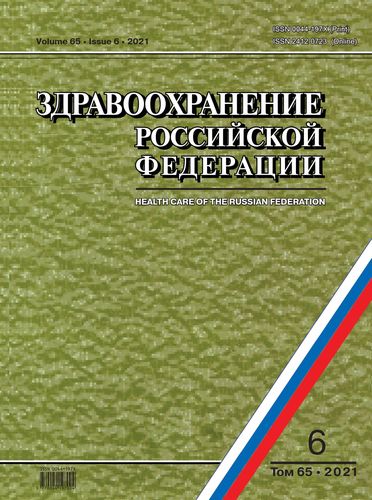Financing of the Program of state guarantees of free medical care: how to solve the deficit problem?
- 作者: Grishin V.V.1, Ragozin A.V.1, Itselev A.A.1, Glazunova S.A.1
-
隶属关系:
- Center for problems of organization, financing and interterritorial relations in health care Institute of the regional economy and interbudgetary relations, Financial University under the Government of the Russian Federation
- 期: 卷 65, 编号 6 (2021)
- 页面: 514-521
- 栏目: HEALTH CARE ORGANIZATION
- ##submission.dateSubmitted##: 25.10.2024
- URL: https://hum-ecol.ru/0044-197X/article/view/637705
- DOI: https://doi.org/10.47470/0044-197X-2021-65-6-514-521
- ID: 637705
如何引用文章
全文:
详细
Introduction. The critical problem of Russian health care is the deficit of funding for the program of state-guaranteed medical care for citizens of Russia.
Purpose of the study. To search for solutions to the problem of financing the deficit of the program of state guarantees of free medical care in the Russian Federation.
Material and methods. Retrospective data analysis was carried out to analyse the reasons for the deficit in the financing of the program of state guarantees of free medical care and search for solutions in the experience of other countries.
Results. The analysis showed that the reasons for the deficit of the program of state guarantees of free medical care are the shortcomings of the mandatory health insurance (MHI) income system: linking contributions for the working population to the wages fund; the vagueness of the definition of the non-working population and the payment of contributions for its MHI by the constituent entities of the Russian Federation; non-participation of the solvent population in the co-financing of medical care; deficit of economic integration between the payment of MHI treatment and the health care system; the absence of formalized mechanisms for reimbursing the expenses of the MHI system by the federal budget to pay for aid in catastrophic situations.
Discussion. The authors see the solution to the problem of the deficit of the program of state guarantees of free medical care in the modernization of the MHI income system: replacement of the MHI contributions paid by employers with an additional “medical” part of the value-added tax; replacement of the MHI contributions paid by the constituent entities of the Russian Federation for the non-working population with a targeted “medical” tax on retail sales; creation of a system of additional income based on the principle “the guilty person pays for causing harm to health”; recognition of the cost of medical care to the population in catastrophic situations as an unconditional obligation of the federal budget.
Conclusion. A systemic solution to the problem of the financing deficit of the program of state guarantees of free medical care for the citizens of Russia seems to be the modernization of the MHI income system.
作者简介
Vladimir Grishin
Center for problems of organization, financing and interterritorial relations in health care Institute of the regional economy and interbudgetary relations, Financial University under the Government of the Russian Federation
编辑信件的主要联系方式.
Email: noemail@neicon.ru
ORCID iD: 0000-0002-4356-8128
俄罗斯联邦
Andrey Ragozin
Center for problems of organization, financing and interterritorial relations in health care Institute of the regional economy and interbudgetary relations, Financial University under the Government of the Russian Federation
Email: avragozin@fa.ru
ORCID iD: 0000-0003-4645-8765
MD, PhD, Head of the Center for problems of organization, financing and interterritorial relations in health care Institute of the regional economy and interbudgetary relations, Financial University under the Government of the Russian Federation, Moscow, 125009, Russian Federation.
e-mail: avragozin@fa.ru
俄罗斯联邦Aleksandr Itselev
Center for problems of organization, financing and interterritorial relations in health care Institute of the regional economy and interbudgetary relations, Financial University under the Government of the Russian Federation
Email: noemail@neicon.ru
ORCID iD: 0000-0001-6355-1692
俄罗斯联邦
Svetlana Glazunova
Center for problems of organization, financing and interterritorial relations in health care Institute of the regional economy and interbudgetary relations, Financial University under the Government of the Russian Federation
Email: noemail@neicon.ru
ORCID iD: 0000-0002-0758-2440
俄罗斯联邦
参考
- World Health Organization. Health expenditures. Available at: https://gateway.euro.who.int/en/indicators/h2020_30-health-expenditures
- The World Bank. World Development Indicators. Available at: https://datacatalog.worldbank.org/dataset/world-development-indicators
- The World Bank. Out-of-pocket expenditure (% of current health expenditure). Available at: https://data.worldbank.org/indicator/SH.XPD.OOPC.CH.ZS
- Medina L., Schneider M.F. Shadow economies around the world: What did we learn over the last 20 years? IMF Working Papers. 2018; 2018(017). https://doi.org/10.5089/9781484338636.001
- Rosstat. The volume and structure of monetary incomes of the population of the Russian Federation by sources of income (new methodology). Available at: https://rosstat.gov.ru/folder/13397
- The World Bank. GDP per capita (current US$). Available at: https://data.worldbank.org/indicator/NY.GDP.PCAP.CD
- The World Bank. Available at: https://data.worldbank.org/indicator/NY.GDP.PCA.PP.CD
- Price Waterhouse Coopers. Worldwide Tax Summaries Online. Available at: https://taxsummaries.pwc.com
- RBC. Tatiana Golikova — RBC: «Everyone knows what they pay, but they don’t understand why». Available at: https://www.rbc.ru/politics/24/05/2018/5b06cbd39a7947403703c30a?story=5af980859a7947b069a0a9d3 (in Russian)
- World Health Organization. Regional Office for South-East Asia. Tobacco taxation and innovative health-care financing; 2012. Available at: https://apps.who.int/iris/handle/10665/206014
- Stenberg K., Elovainio R., Chisholm D., Fuhr D., Perucic A.-M., Rekve D., et al. World Health Report. Background Paper, 13. Responding to the challenge of resource mobilization – mechanisms for raising additional domestic resources for health. World Health Organization; 2010.
- Earmarked tobacco taxes: lessons learnt from nine countries. Case Reports. World Health Organization; 2016. Available at: https://apps.who.int/iris/bitstream/handle/10665/206007/9789241510424_eng.pdf
- Cashin C., Sparkes S., Bloom D. Earmarking for health: from theory to practice. Health Financing Working Paper No. 5. WHO IRIS Reference: WHO/HIS/HGF/HFWorkingPaper/17.5. World Health Organization; 2017.
- Bird R., Gendron P.P. Is VAT the best way to impose a gene-ral consumption tax in developing countries? B. Int. Taxation. 2006; 60(7): 287–96.
补充文件








